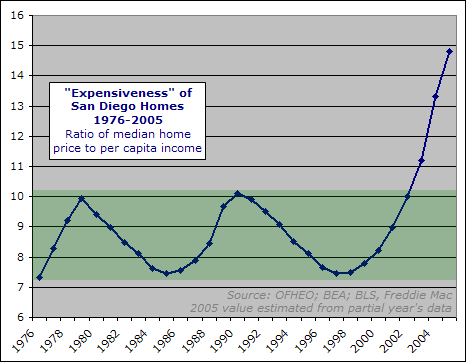
Posted on 03/04/2006 11:09:48 AM PST by ex-Texan
San Diego housing is vastly overpriced.
There, I said it.
Actually, I've been saying it every week since I started writing this column. So I thought that I'd take some time this week to discuss exactly how this situation came to pass.
If San Diego home prices do not reflect economic fundamentals, then exactly how did they get to such rarified heights? It's a fair question and an important one as well. Understanding how the bubble started will be crucial to understanding how it will end.
To begin with, let's travel back to 1997. The San Diego real estate market was fairly depressed, having weathered several years of adverse conditions. The fallout from the prior housing bubble had exacerbated a local recession as the end of the Cold War sent thousands of defense and aerospace workers packing. Home prices had essentially been falling since 1990.
But San Diego's economy was already recovering when the "Goldilocks Economy" of the late-1990s got into full swing. As would be expected in such conditions, the housing market also began to recover and head back toward fair value. As home prices steadily rose over the next few years, the negative sentiment towards real estate that was prevalent throughout the mid-90s was gradually replaced with optimism.
That optimism fueled further homebuying activity and sent prices even higher.
Let's pause for a moment of historical perspective. The accompanying graph which charts the ratio of San Diego home prices to incomes from 1976-2002 -- shows that what had happened so far was nothing new. For 30 years, San Diego housing had bounced from undervalued to overvalued and back. The timing of these cycles had been quite regular, and the distance between the overvalued and undervalued extremes had been contained by an incredibly well-defined channel (highlighted in green on the graph).
By 2002, San Diego's home price to income ratio had reached its historical high point once again. Given the lack of housing affordability and the shakiness of the economy, one might have expected that home prices would begin to moderate at this point and make their way down to the bottom of the valuation channel, as they had always done in the past. But one would have been mistaken.
This time, as the saying goes, was different, and the difference could be described in one word: credit.
In an attempt to stimulate the faltering economy in the wake of a stock crash, a recession, and the Sept. 11 attacks, Alan Greenspan and the Federal Reserve had embarked on a rate-slashing frenzy that would not stop until the Federal Funds Rate had gone from 6.5 percent down to a multi-generational low of 1 percent. Unfortunately, what the Fed primarily succeeded in stimulating was a wave of unprecedented lending excess in which rates and lending standards dropped dramatically.
It was like pouring gasoline on a fire.
Rather than flattening out, San Diego home prices exploded into 2003 and 2004 on the wave of easy credit. Homebuyers' sense of invincibility and optimism was now absolutely ubiquitous, and people's willingness to take on more risk grew as fast as prices. Lending begat more lending and the borrowed money drove home prices ever upward. Lending institutions, emboldened by the rise in the value of their collateral, started to lend more and more freely.
By 2004, home prices were well beyond all rational measures of fair value, but that didn't matter. No price was too high to pay for the money-making machine that was a San Diego home. The early-2004 bout of panic-buying represented the peak from a sentiment standpoint, but home prices managed to claw their way even higher into 2005.
Things have been winding down since then, due partly to the Fed's leisurely interest rate increases, partly to the dawning recognition by many San Diegans that we are indeed experiencing a bubble, and partly to plain old exhaustion as the market slowly runs out of people willing to buy at these levels.
It certainly appears that the party is over, but with a speculative bubble, one can never know for sure. In the meantime, it will be easier to figure out where we are going if we understand how we got here in the first place.
Rich Toscano is an independent real estate analyst residing in Hillcrest and working in La Jolla. He writes extensively about San Diego housing at Piggington's Econo-Almanac.

I love the bubble. It paid for my house in Montana and got me away from freeways, traffic lights, phony people (there are a lot of good ones in Caleefornia, though), high taxes, high fees, etc.
Repeat my mantra, " A simple life is a better life."
So9
Yep. Just *escaped* from Central Florida. Land of eternal traffic jams and magnet for the great unwashed.
Getting a house here in Kentucky that I could never afford there. I will never return to Florida.
That's what I've always beleived. It's the size of the mortgage payment that determines house affordability. I blame a lot of the exotic loan products for driving prices skywards. Interest only or less than interst only loans are making people take out bigger and bigger mortgages.
So9
Well, maybe it is catching. My sister works in real-estate loans for the Las Vegas area, her company just laid off 25 processors and will not pay commissions for the next 90 days - she says it has "gotten really quiet around here". 'course with new homes running 400K or more.....
Disclaimer: Opinions posted on Free Republic are those of the individual posters and do not necessarily represent the opinion of Free Republic or its management. All materials posted herein are protected by copyright law and the exemption for fair use of copyrighted works.